“Snapshots of Hope: A Volunteer’s Journey in Kenya” by Nonie Kingma
What Was It Like?
It was hot. The sun at the equator is direct and intense.

It was exhausting. Our days were full and long going from school-to-school checking on water catchment tanks and handwashing stations. It was the end of a long dry season and some of the tanks had run dry which meant that sometimes children had to stop at water sources along their way to school and carry their own water each day. With an application to P4P it was possible that schools in need could be afforded more tanks. This information was relayed again and again at various schools. 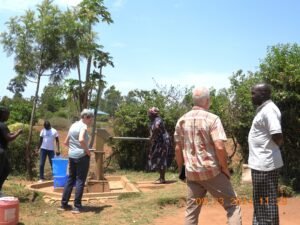
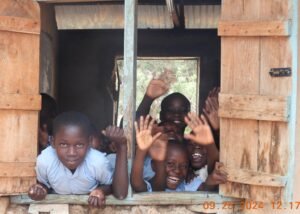 The children were a delight! Our arrival was generally a big disruption to their school day. They were all excitement, smiles and greetings, “Mzugu! Mzugu!”, they’d yell, (this is the Swahili word for white person) and then, with the English that they were learning in school, they would follow with, “How are you?”. They loved having their picture taken and would get goofy for the camera just as any child in any part of the world might do. It was fun!
The children were a delight! Our arrival was generally a big disruption to their school day. They were all excitement, smiles and greetings, “Mzugu! Mzugu!”, they’d yell, (this is the Swahili word for white person) and then, with the English that they were learning in school, they would follow with, “How are you?”. They loved having their picture taken and would get goofy for the camera just as any child in any part of the world might do. It was fun!
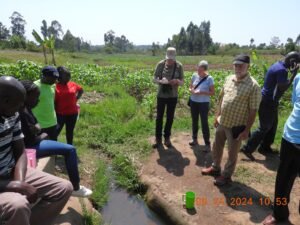
Throughout the week we also checked out water holes, boreholes and pumps to see if the communities had access to a safe and reliable source of water.
There were meetings with community members out under the trees and at water holes. The community leaders were gracious and skilled communicators. After standing to speak they would introduce themselves, state their position in the community and then always begin by thanking P4P for the help it had provided over the years before clearly conveying their current issues and needs. Wayne was particularly adept at looking at problems with pumps and water sources and explaining how they might be fixed or improved. There were always lots of “Karibu” (welcome), handshakes and smiles which reveals the warm and friendly relationship P4P has developed over the years with these folks.
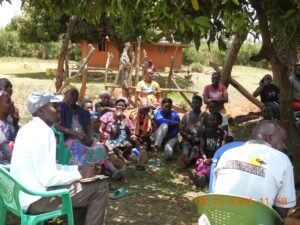
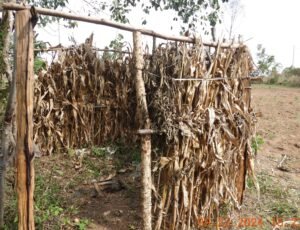
Then there was latrine day – tromping from one to the next to assess their availability and condition. For the most part they were functional but nothing more. Many were in serious need of repair and there is a real need for more of them.
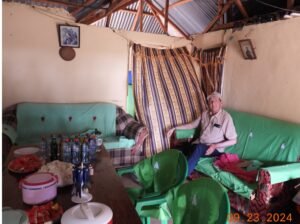
Every day, lunch was prepared by the wives of one of the staff members. The food was truly delicious and plentiful. Afterwards we’d sit out under the trees for a short while and this was when I’d need a nap – so full was my stomach and so pleasant the breeze.
My favorite day that week was when Patti and I spent time at the clinic where P4P’s POM program is administered. Here we met with a group of women (mostly, though there was one grandfather) who brought their babies and grandbabies to the clinic for nutritional assistance. The children are weighed and measured each week and the families are given a meal and some food to take home. Some of the children there were dangerously malnourished and I saw with my own eyes how this organization actually saves lives in a very direct way. The women are also counseled and assisted with the various other challenges they face in providing for their families.

Our group made a few visits to the homes of nutritionally at-risk children in the villages. I was so impressed with Patti’s skill at getting her assessments done with such gentleness and respect that the children allowed it without protest. It was a privilege to be there.

Interspersed in all these days we visited so many farms that I lost count of them. P4P’s work with helping families farm in such a way as to increase the yield from their small plots is also life-saving and enables people to not only care for their nutritional needs but also to bring in more money from their crops. At one farm we were given a demonstration and a hands-on opportunity to participate in setting up a plot using the “Farming God’s Way” methodology. David and Patti planted seeds in that plot. Someday soon the plants grown from those seeds will make a difference. 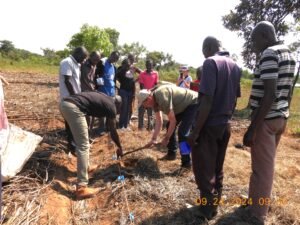 On the evening of our last day, after our evening meal, we were asked to talk about our impressions of the week. Each person stood and spoke about the important work being done by the incredibly skilled and knowledgeable staff and volunteers who live in and around the villages where P4P is established.
On the evening of our last day, after our evening meal, we were asked to talk about our impressions of the week. Each person stood and spoke about the important work being done by the incredibly skilled and knowledgeable staff and volunteers who live in and around the villages where P4P is established.
When it was my turn, I started by recalling that there was a poet who said, “If I can ease one life…” then I became tearful and could not finish. I was exhausted. But here is what I would have liked to have conveyed had I been able to keep my composure: The poet said, “If I can ease one life the aching, or cool one pain…I shall not live in vain.” The people of P4P (especially the dedicated field staff) do this – easing life’s aches and cooling life’s pains – day in and day out in a very real, substantial way and they do it with amazing professionalism, knowledge, skill and grace. Certainly, they have met the standard to not have lived in vain countless times over.


Recent Comments